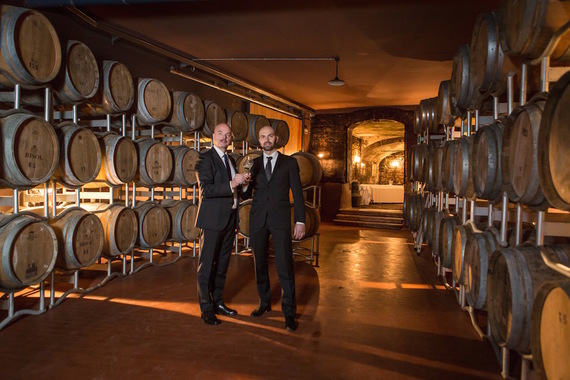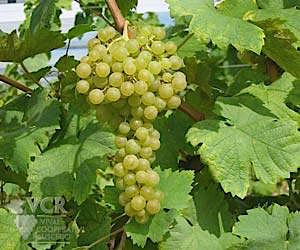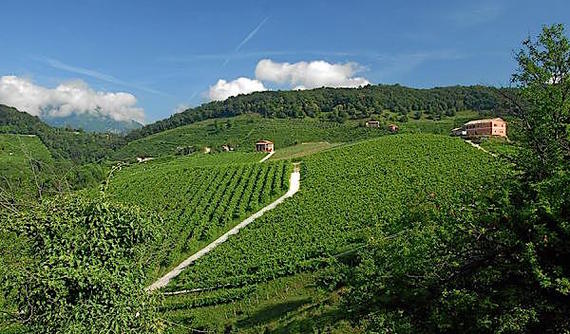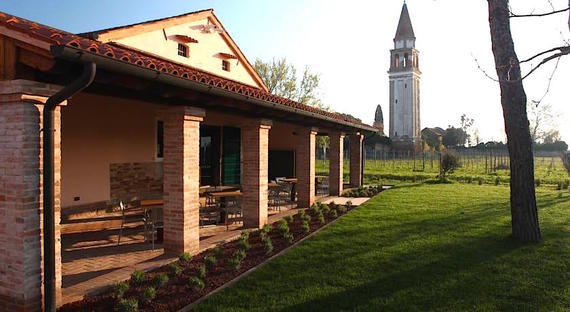Gianluca Bisol, President and CEO of the namesake Italian winery he co-owns with his brother, enologist Desiderio, was sitting at New York's most iconic restaurant, `21' Club, biting into its massive $36 signature hamburger with ketchup and crisp French fries.
"This is fantastic!" he exclaimed, " and look how well it goes with Prosecco." In fact, the sparkling wine from Italy's Veneto region was delicious with the rare burger, as it was with a platter of Florida stone crabs and grilled Dover sole.
"People think of prosecco as an aperitif and as an ingredient in the bellini cocktail, but a good one like Bisol is a very versatile wine: perfect with seafood and, because it's sparkling, it helps refresh the palate when you're eating a hamburger with ketchup and French fries." Gianluca should know: his family has been making wine in the Valdobbiadene and Conegliano regions since 1542, and they've been expanding--now with more than 20 plots of land in the most prestigious zones for Prosecco, which under Italian wine laws is a "D.O.C.G." (a wine guaranteed to be of a specific controlled origin). Bisol also directly manages three hectares on the Cartizze hill, whose location and terroir make it one of the world's most valuable wine terroir, estimated at 2.5 million euros per hectare. Bisol's family motto remains "Excellence from the ground to the bottle."
"We work with great passion so that Conegliano can have the same prestige as Reims and Valdobbiadene the same appeal as Épernay," said Gianluca, referring to the regions in France where the finest Champagnes are made. "But such a reputation only comes with passion and investment. Every day my brother and I are presented with at least one opportunity for improvement."
Bisol, along with a slew of other Prosecco producers in the Veneto--some producing sweet, fizzy stuff hardly worthy of the name--have reason to gloat: Prosecco has transcended its image as a cheap bubbly best used in making Italian cocktails (the bellini was invented decades ago at Harry's Bar in Venice, combining white peach juice with Prosecco), so that today sales surpass that of Champagne, with 307 million bottles of Prosecco sold globally in 2013 versus 304 million of Champagne. In Great Britain alone this year sales have increased 72 percent.
Still, Bisol has to fight the old image, even to the point of differentiating Prosecco from Asti Spumante, a sparkling, sweet wine from Piedmont made with the moscato grape and Lambrusco from Emilia-Romagna. There is also competition from the region of Franciacorta, whose producers make their sparkling wine by the laborious and expensive "Champagne method." Prosecco, made from Glera grapes (above), is made by the bulk Charmat process by which the natural secondary fermentation of the wine is produced in a tank rather than in bottles. Most Prosecco is not vintage dated.
"Using the Charmat process is better for Prosecco, which is not made to be aged," said Gianluca. "It keeps the freshness and sparkle of the wine while preserving its fruit. We have done some experiments with the Champenoise method with our Eliseo Bisol Cuvée del Fondatore, made from from a selection of the best Pinot Bianco, Chardonnay, and Pinot Nero grapes, then aged for a minimum of 100 months."
Bisol is the biggest producer of Prosecco in the region and certainly the most innovative. What I like about their wines is precisely that fruit characteristic, with just a touch of sweetness, all of it buoyed by the bubbles and exceptional freshness because of the acidic content. So many Proseccos are either two sweet or too unbalanced, whereas Bisol's equilibrium of elegance and stimulating effervescence combines with green apple sweet-sour flavors that do indeed go well with all kinds of foods. Bisol's range of Proseccos are of various degrees of dryness.
Jeio ($15) has a less pronounced sparkle and wonderful aroma. Made from carefully selected grapes, Jeio is a nickname for Desiderio given him by his wife. It is perhaps the most amiable expression of the terroir of the best plots of Valdobbiadene. Bisol also makes an enchanting rosé version.
Prosecco Crede ($18) is a blend of 85 percent Glera, 10 percent Pinot Bianco, and 5 percent Verdiso. When compared with other Proseccos of the same or lesser price, its superiority comes into clear focus. The name comes from the clay-rich soil it grows in, and it has that clean, well-constructed equilibrium that makes it easy to enjoy with just about any meal that isn't too heavy with garlic or vegetables like asparagus.
Coming from that very expensive Cartizze vineyard, Prosecco Superiore Cartizze (right) is a cru, referring to a specific vineyard, a definition Bisol pioneered in the region. This is one of the most refined of Bisol's wines, with more body but great delicacy. It's superb with cheeses or lightly sweet desserts. I've seen it priced between $45 and $60 in U.S. wine stores.
Given their success, the Bisol family has invested in agrotourism in the Veneto, which includes Venissa (below), an ancient walled vineyard in the Venetian lagoon where they produce a dry wine called Venissa from the Dorona varietal--a grape once thought extinct. They have also invested in the Maeli winery in the Euganaen Hills, producers of a Moscato Giallo.
The dilemma of Prosecco producers today is that on the one hand they have been wildly successful in selling their easy-to-like sparklers; on the other, producers like Bisol wish to compete with Champagne not just in sales--a battle it has already won--but in reputation, which makes the Bisol brothers work all the harder.



